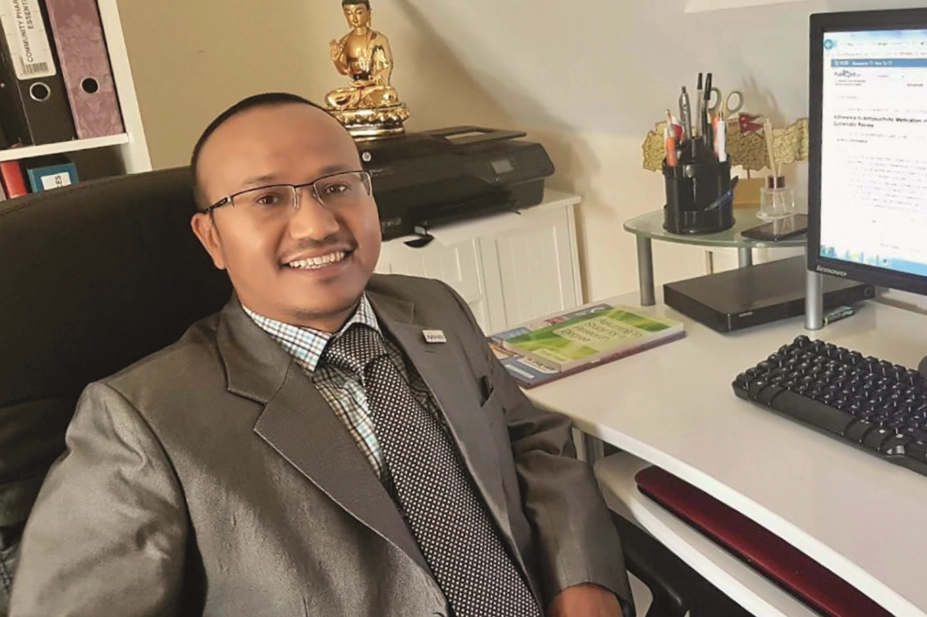
Courtesy of Asta Prajapati
Words of wisdom
The wisdom of some of the world’s most famous and inspirational spiritual leaders has motivated Asta Prajapati throughout his life and has been pivotal to his career success as a mental health pharmacist.
Spiritualists such as German-born Eckhart Tolle have taught him to banish negative thinking, live in the moment to overcome challenges and to meditate regularly.
Armed with a Masters in Psychiatric Pharmacy from Aston University Prajapati is ambitious, confident and getting himself noticed. This year he became the first mental health pharmacist to receive a National Institute of Health Research (NIHR) Clinical Doctoral Research Fellowship (CDRF) funding award.
The NIHR is the largest national clinical research funder in Europe with a budget in excess of £1bn. Its funding is designed to support individuals who are passionate about cutting-edge research.
A passion for research
Prajapati was born in Nepal and achieved a BPharm with distinction from Kathmandu University. The 42 year old describes his personality as cheerful, focused and calm, and says following the teachings of divine teachers such as Tolle ensures he is in the right frame of mind to triumph at work and at home.
He currently works one day a week as a consultant pharmacist at Hellesdon Hospital in Norwich, having joined Norfolk and Suffolk NHS Foundation Trust (NSFT) in 2014. He now spends the rest of his time as an HEE/NIHR Clinical Doctoral Research Fellowship trainee.
Prajapati has been awarded £350,000 which he will spend over the next four years completing his NSFT/University of East Anglia-led research programme.
He wants to create a tool to help identify patients with bipolar disorders who, for one reason or another, are struggling to take their medication. He will work closely with psychiatrists, other healthcare professionals, researchers and patients.
“Research is in my blood and as a pharmacist I want to look deeper into what is happening around different areas of mental health to get a better understanding of how we can help people,” says Prajapati.
Bipolar disorder is a long-term mental health condition that causes severe mood swings and makes it difficult for patients to maintain a stable job or relationships. It can reduce sufferers’ quality of life and increase the risk of suicide.
Medication is the most common and effective treatment but around 40% of patients do not take their drugs as prescribed. This non-adherence can cause symptoms to return.
The research aims to improve adherence by discovering why people actively stop taking their medicines.
“One thought is there is a lack of insight for patients themselves,” says Prajapati. “In the mental health area it can be hard for patients to process the information we give them. There is also a stigma around telling other people, including family and friends, that you are taking medication.”
A three-step process
There are three stages to Prajapati’s research:
- First he will undertake a systematic review of the barriers and facilitators of medication adherence in bipolar disorder and organise these into the domains of the Theoretical Domains Framework;
- The second stage will be a qualitative study using focus groups and interviews with patients with bipolar disorder and their carers to explore further obstacles and facilitators;
- The third piece of the study will finalise the medication adherence tool and test it with around 600 patients with bipolar disorder.
Prajapati hopes his research will raise the profile of pharmacists working within mental health and within the broader NHS where he feels their expertise remains largely untapped. Pharmacists are aware, for instance, that not all prescribed medications are essential and must be taken.
“As we know in the NHS, pharmacists are leading the evidence-based medicines optimisation agenda. Some prescribed medication is unnecessary and can do more harm than good and in such cases prescribing of such medication may need to be stopped,” he says. “The NHS needs to make more use of pharmacists’ skills and research to improve safety.”
Overcoming challenges
Prajapati remains frustrated by the lack of senior NHS executives who are from a pharmacy background. This can mean there is a lack of knowledge of how pharmacists can help organisations achieve their goals. “Perhaps too many pharmacists are inward looking and this is limiting their professional identity and potential?”
While obtaining the funding for his research was great news for Prajapati and the role of mental health pharmacists, he admits that the process of obtaining the money was not easy. The two-step application procedure was extensive and highly competitive, and he recommends that future applicants start at least six months to a year before the deadline for submissions.
“There were times when I questioned whether it was all worth it and thought about giving up but then I remembered the spiritual teachings and focused on the positives,” says Prajapati. “I spent about one year on the application but I was lucky that my NHS organisation and chief pharmacist were very supportive and flexible so I could complete it as well as do my work.”
Pharmacy research
Although he is the first mental health pharmacist to be granted funding, other pharmacists, working in physical health, have received money.
They include Pinkie Chambers, a pharmacist at University College London Hospitals NHS Foundation Trust, who has been awarded £276,432.00 for research into: ‘Are the Blood Testing Schedules within Chemotherapy Treatment Protocols Optimal for Patient Care?’
And Gemma Donovan who has been awarded £281,164.00 to undertake her research: ‘A Text message Intervention to support Medicines adherence mobilised though community pharmacy’ at the University of Sunderland.
Inspiring others
“My own funding moves mental health higher up the health agenda and is not only getting it talked about but seeing action taken,” says Prajapati. “I hope it will inspire other mental health pharmacists to use research and apply for funding. There is still a lack of awareness among the mental health community that this funding is available.”
He originally applied for an award after working in the NHS for many years and becoming frustrated by what he describes as ‘revolving door’ patients in mental health. People are admitted to a ward, receive treatment and are then discharged. However, after a couple of months many return to the hospital because they have not been taking their medication.
“I saw this as inefficiency in the system, but most importantly causing patient suffering. I wanted to see if I could utilise my medicines expertise to improve adherence and thereby patient outcomes.”
This is not the first funding award Prajapati has received. In 2017 he was given £5,000 by the College of Mental Health Pharmacy as part of its Pharmacy Practice Research Award programme.
Sources of funding
Pharmacists require access to funding to put their ideas into action and there are a number of options available, including Pharmacy Research UK funding and pure academic grants.
“The funding ultimately pays for me to live so I can focus on the research,” he says. “It will cover tuition fees and other training costs as well as the expense of hiring expert support including a statistician, academic pharmacists and a health psychologist. This is a collaborative project.”
It can be a challenge to apply for and receive funding, and pharmacy is arguably behind the curve in comparison to other professionals when it comes to research.
“There is a lack of knowledge in terms of the money available and funding sources but these barriers should not deter any motivated individual from applying for research funding.”
Prajapati’s extensive published writing helped to open some doors for him and generate interest. He is proud of having achieved published status despite not having an academic career background.
For example, his papers have included: ‘The role of metformin in the management of antipsychotic-induced weight gain’ published in Progress in Neurology and Psychiatry; and ‘Pharmacotherapy vs. Psychotherapy in the management of depression and anxiety disorders’, which appeared in the International Journal of Psychotherapy.
Patient benefit
So once the research has been completed and the findings analysed and action taken, how will patients benefit?
Ideally the new tool will help clinicians to identify patients who are struggling to take their medication as prescribed and recognise the specific difficulties, challenges and barriers they face.
“Since these barriers and facilitators will be mapped to the domains of the Theoretical Domains Framework (TDF) the service provider will be able to offer evidence-based individual guidance and support to help people change their behaviour.”
He rates achieving the HEE/NIHR CDR Fellowship funding award as a highlight of his career, but he remains ambitious.
In future he would like to combine his clinical skills with research and become a leader in the clinical academic field. The HEE/NIHR funding has given him a career pathway to fulfil his potential and eventually fulfil his dream of becoming a professor.


